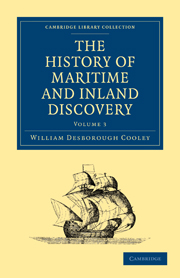Book contents
- Frontmatter
- Contents
- CHAP. I PROGRESS OF GEOGRAPHICAL SCIENCE
- CHAP. II VOYAGES OF BYRON, WALLIS, CARTERET, ETC
- CHAP. III COOK'S FIRST VOYAGE
- CHAP. IV COOK'S SECOND VOYAGE
- CHAP. V COOK'S THIRD VOYAGE
- CHAP. VI COOK'S THIRD VOYAGE CONTINUED
- CHAP. VII VOYAGE OF LA PEROUSE, ETC
- CHAP. VIII EUROPEANS IN THE SOUTH SEA
- CHAP. IX THE COASTS OF AUSTRALIA
- CHAP. X INTERIOR OF NEW HOLLAND
- CHAP. XI VANCOUVER'S VOYAGE
- CHAP. XII INTERIOR OF NORTH AMERICA
- CHAP. XIII ROSS AND PARRY
- CHAP. XIV PARRY'S VOYAGES
- CHAP. XV JOURNEY OF CAPTAIN FRANKLIN
- CHAP. XVI SECOND JOURNEY OF CAPTAIN FRANKLIN
- CHAP. XVII HUMBOLDT'S TRAVELS
- CHAP. XVIII HUMBOLDT'S TRAVELS CONTINUED
- CHAP. XIX SOUTHERN EXTREMITY OF AMERICA
- CHAP. XX EASTERN SHORES OF ASIA
- CHAP. XXI TRAVELS IN THE HIMALYEH
- CHAP. XXII BRUCE'S TRAVELS
- CHAP. XXIII PARK'S TRAVELS
- CHAP. XXIV DENHAM AND CLAPPERTON'S TRAVELS
- INDEX
CHAP. III - COOK'S FIRST VOYAGE
Published online by Cambridge University Press: 05 October 2010
- Frontmatter
- Contents
- CHAP. I PROGRESS OF GEOGRAPHICAL SCIENCE
- CHAP. II VOYAGES OF BYRON, WALLIS, CARTERET, ETC
- CHAP. III COOK'S FIRST VOYAGE
- CHAP. IV COOK'S SECOND VOYAGE
- CHAP. V COOK'S THIRD VOYAGE
- CHAP. VI COOK'S THIRD VOYAGE CONTINUED
- CHAP. VII VOYAGE OF LA PEROUSE, ETC
- CHAP. VIII EUROPEANS IN THE SOUTH SEA
- CHAP. IX THE COASTS OF AUSTRALIA
- CHAP. X INTERIOR OF NEW HOLLAND
- CHAP. XI VANCOUVER'S VOYAGE
- CHAP. XII INTERIOR OF NORTH AMERICA
- CHAP. XIII ROSS AND PARRY
- CHAP. XIV PARRY'S VOYAGES
- CHAP. XV JOURNEY OF CAPTAIN FRANKLIN
- CHAP. XVI SECOND JOURNEY OF CAPTAIN FRANKLIN
- CHAP. XVII HUMBOLDT'S TRAVELS
- CHAP. XVIII HUMBOLDT'S TRAVELS CONTINUED
- CHAP. XIX SOUTHERN EXTREMITY OF AMERICA
- CHAP. XX EASTERN SHORES OF ASIA
- CHAP. XXI TRAVELS IN THE HIMALYEH
- CHAP. XXII BRUCE'S TRAVELS
- CHAP. XXIII PARK'S TRAVELS
- CHAP. XXIV DENHAM AND CLAPPERTON'S TRAVELS
- INDEX
Summary
The interests of science and the acquisition of geographical knowledge entered largely into the motives of the circumnavigations above related. But the first expedition of importance, fitted out wholly for scientific objects, was that intrusted to the command of the celebrated captain James Cook. This great navigator was born of humble parents: his father was an agricultural labourer, whose steady conduct was at length rewarded by his employer with the situation of hind or under steward. As he had nine children, and his means were slender, he was unable to assist materially their individual exertions to procure a livelihood. James, when thirteen years of age, was apprenticed to a shopkeeper at Straiths, a fishing town not far from Whitby; but the predilection of young Cook for the sea was soon manifested with that strength of inclination which is sure to accompany peculiar talents. He engaged himself for seven years with the owners of some ships employed in the coal trade; and, when the period of his engagement was expired, he was promoted by his employers to the rank of mate of one of their vessels. The coal trade of England, being chiefly carried on near a singularly dangerous coast, where unceasing vigilance is required on the part of the seamen, constitutes the best school of practical mariners in the world. Cook, who obeyed his own inclinations when he turned sailor, profited, no doubt, in the highest degree, from the opportunities which his coasting voyages afforded him of becoming acquainted with the practical part of navigation.
- Type
- Chapter
- Information
- The History of Maritime and Inland Discovery , pp. 28 - 44Publisher: Cambridge University PressPrint publication year: 2010First published in: 1831



